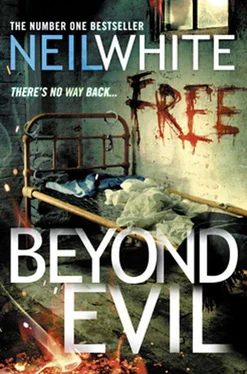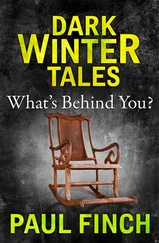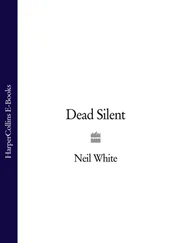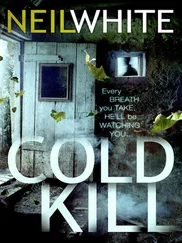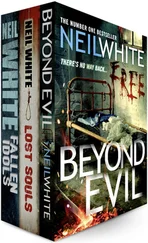Sheldon stopped eating for a moment and said, ‘Do you have any suspicions?’
‘Drugs,’ Ted said. ‘People told me that there were always a lot of drugs at the house, but they thought Billy was running out of money. He used to buy cars just so they could race them on the field behind his house, but for the few months before Alice’s death all he had done was repair the old ones. And he was starting to buy dodgy vodka, and was selling the drugs, cocaine and cannabis mainly, not giving it away. That’s why people weren’t as bothered about missing out on the parties. Too many people had watched their boyfriends or girlfriends sleep with other people, just because the mood was right, but if they were going to have to pay for it, what’s the point, right? Billy thought he was Mister Popular, but he wasn’t. He was just the mug willing to spend his money.’
‘So why drugs?’
‘Because he must have been in debt to dealers if he was stocking up so much but running out of money. It would explain why he was so scared to say anything. I think he got a visit from someone big, and things got out of hand. Alice was a good girl, but she would speak her mind, and so I wonder whether she had said the wrong thing, tried to show that she couldn’t be bullied. But she wouldn’t know what those people were like, and so things just got nasty.’
Sheldon nodded as he ate his curry. ‘That makes a lot of sense. He was still taking drugs before he died, because we found a dealer list in his house, but his silence might have extended his credit line. We looked at the drugs angle, but there was no intelligence about where he was getting his drugs. Because of the quantities, we thought that he had gone higher up the chain, to the wholesaler, not the street dealer, and they are harder to track. We always know the street dealers, because your bottom-rung junkies will tell you anything to keep on your good side, just to make sure they always get bail, or so we won’t bust their door down. The higher up you go, the more it becomes about money, and so people stay quiet. No one knew where Billy was getting his drugs from.’
Ted sighed. ‘So we both came up with nothing except theories.’
Sheldon nodded. ‘It seems that way.’
Ted stayed silent as Sheldon finished his food, until the chirp of Sheldon’s phone disturbed the peace.
Sheldon reached into his pocket and saw that it was a number he didn’t recognise. He clicked the answer button.
‘Hello?’
‘DI Brown?’ It was a man’s voice.
‘Yes.’ There was no need to correct him.
‘I’m PC Ellis. I work in Southern Division. I saw the email that was sent round earlier, with the young woman’s photograph. Your number was on it.’
Sheldon looked at Ted, who was sitting up straight, watching him. ‘Go on.’
‘I know her,’ Ellis continued. ‘There is a care home here, New Pastures. It keeps most of us busy. I recognised the girl in the photograph, although it threw me, because she isn’t called Christina. It’s Lucy, Lucy Crane.’
‘Any form?’
‘Not much, but she was a constant misper, always turning up in the houses of the local pervs, her pockets filled with fags and stinking of booze. I don’t what happened to her because I got posted elsewhere, but it looks like her.’
‘How sure are you?’
‘Pretty sure.’
‘Thank you, PC Ellis,’ Sheldon said. ‘Keep this conversation to yourself for the moment.’
‘No problem, sir. Glad to help.’
When Sheldon clicked off, he got to his feet. Ted looked at him curiously, and then scrambled to follow him when Sheldon said, ‘I think we’ve got something.’
Chapter Thirty-One
Charlie walked quickly away from the quarry, heading straight to Donia’s flat in the town centre where she had the Billy Privett file.
Marshall Avenue was one of the main roads out of Oulton, down a hill and lined by trees, an attempt to create some suburbia amongst the industrial units and workers’ cottages. Charlie didn’t look up as he went past dusty shop fronts and neglected pubs. He straightened his clothes so that people wouldn’t recall the dishevelled man in the suit, because the best chance he had was to blend into the background.
He kept on looking round as he walked, always ready for the shout of the police, wary in case it was a trap. He turned quickly onto Marshall Avenue and saw how it stretched downwards, grass verges bordering the road, the trees forming a canopy so that it was all in shadow. Number sixty-six was a double-fronted building in pale glazed bricks, with yellowing net curtains in every window. He had another quick look around, to check for dark uniforms hidden behind lampposts, but then realised that he must have watched too many films. He had no weapons, and was just some scruffy lawyer heading too quickly for his fortieth birthday. They could approach him at a saunter and he would have little chance of getting away.
He pushed at the door and it opened into a communal hallway. It was all shades of brown, with plywood-finish doors and a number 1 in fake marble pinned to the first one. The stairs were narrow and dark, but it was the only way forward.
There was a television playing in one of the flats, and as he climbed, the landings just got darker. The switch for the lights was a push-button timer that slowly released itself, but it didn’t give him enough time to get upstairs. By the time he got to the top floor, flat number six, he had to feel his way along, the number visible only in silhouette against the faint light that came through a glass door. There were small steps on the other side, and so he guessed that it was the loft flat.
Charlie knocked at the door, but there was no answer. All he could do was wait.
His phone rang. He checked the screen. It was Julie, his ex. When he pressed the answer, he let Julie speak first.
‘Charlie, it’s me. I’ve heard about Amelia. We need to talk to you about what happened.’
Charlie thought about whether to answer, but the urge to know what was being said was too strong. ‘What’s the word? Why do you want to speak to me?’
‘I can’t tell you that. You know how it is.’ There was a pause, and then, ‘You need to come in, Charlie.’
‘What, to the station?’
‘Yes. They need to talk to you.’
Charlie closed his eyes for a moment. It felt like everyone was closing in on him.
‘No, I can’t,’ he said, and then he clicked off his phone.
More than an hour passed before he heard footsteps. He had spent that time with his head in his hands, expecting the sound of the police rushing the stairs, but it had stayed quiet. So he had gone over Amelia’s death in his head, trying to make some sense of it all. But he couldn’t, however much he tried, because he didn’t know what was behind it, other than it somehow involved Billy Privett.
He heard footsteps, and tensed up, waiting for the glimpse of a uniform, but he knew it was Donia before he saw her. The footsteps weren’t heavy enough to be the police. When she rounded the corner, she smiled and held out her shoulder bag. It looked heavy.
‘I got it,’ she said.
‘Let’s get inside,’ Charlie said, nodding gratefully but not up to returning the smile.
Donia’s apartment was dark and smelled fusty and damp, or perhaps it was just old cigarettes. There were two bedrooms, but there was a bunk bed in the hallway as well, and so he guessed that in the summer it was all about cramming them in, living off the hill walkers. The carpet was rough carpet tiles, cigarette burns in some, and as he turned into the living room, he saw that it was just a collection of chairs with wooden arms facing a small television, heat provided by a three-bar electric fire topped by plastic coals.
Читать дальше
Конец ознакомительного отрывка
Купить книгу
